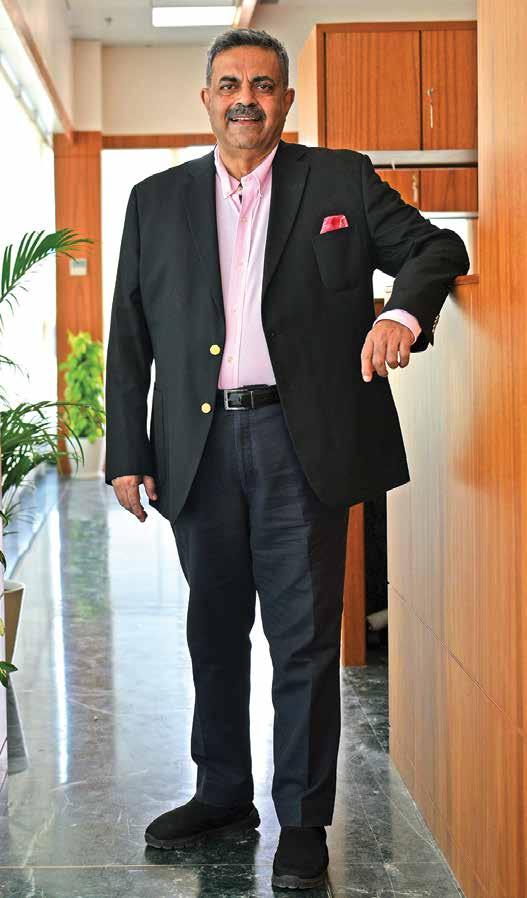
4 minute read
Tushar Jani Group Chairman, CSC
t ushar ja ni
Cargo Service Center (CSC) never stopped functioning during the lockdown. In fact, CSC was commissioned for the movement of COVID-19 materials; we had been in the forefront to support countries in need for health relief material. Tus har
Advertisement
Jani, Grou p Chair man, Car go Serv ice Center
(CSC) informs Ajeet Kumar, how CSC's pharma facilities kept operating 24x7, providing lifeline support for pharma export which in turn helped import material for COVID-19. He also informs about the country's logistic sector which is undergoing rapid innovations, and how logistics service providers have to be agile, flexible and conceptualise strategies that gel with the sector's future orientation.
Post-lockdown, how long would you estimate it would take for our industry to get back to business as usual? What will be the growth drivers? The normalcy of flights will take a longer time than expected to come to the pre-COVID-19 levels. As far as cargo is concerned, India is operating at 50 per cent capacity of the demand for cargo. Carriers have converted their passenger aircrafts for freighter operations, but as the time passes, probably, we will still have 30 to 35 per cent lesser cargo vol

umes flown compare to the previous year. This will result in firmed up strong freight rates.
For passenger flights to start, it will take much longer time. And to come to pre-COVID-19 levels, the movement of passengers flights will take a minimum of two years.
How has Cargo Service Center (CSC) been providing customer experience during the lockdown? Being in the air cargo handling services sector which has been declared part of essential services, we never stopped functioning during the lock down. In fact, we were commissioned for the movement of COVID-19 materi als. I’m happy to see that the air cargo handling industry has been at the fore front and supporting countries in need for health relief materials, more than ever before.
Cargo Service Center (CSC) in par ticular has pharma facilities in Mumbai, Ahmedabad and Delhi. We had been operating 24x7 and successfully provid ing lifeline support for pharma export which in turn helps import material for COVID-19 into the country. It also helps balance air cargo movement.
The consumer sentiment being low now and considering economic downturn across the globe, what will be the scenario of logistics services required in the next couple of years? The logistics services sector is undergoing rapid innovations. This is required when you have growth and also when there is a recession. The logistics service providers therefore need to be agile, flexible and conceptualise strategies that gel with the sector's future orientation. If I were to describe, the current phase is of survival and the next phase will be a revival.
The '3 Vs' important for logistics are velocity, visibility and variability.
These three will continue to play an important role.
Experts say the industry will also see a lot of automation across industries with fewer staff and more machines doing the job. Is this a curious case of commercial consideration or a business continuity necessity? Automation for the logistics industry in India, in my personal opinion, is a long way forward. However as we move from digitisation to digitalisa tion, we will see the exchange of data between the players becoming more efficient. We will see more new inno vations taking over the industry. The government has already stepped up with the right policies and procedures; it’s time for the industry to respond and leverage the opportunities. Can we expect more automation coming into the entire supply chain for the handling of cargo in a multimodal network? Automation in supply chain and handling of cargo, as I stated before, is a long way forward for India. The reason being it is a highly capital intensive pro gramme, while the logistic yield in India is one of the lowest in the world. In my personal opinion, the sector has not yet matured to bear that cost.
Do you see some modal shifts in the way the industry had been working earlier? I see huge cooperation and more coordination in the industry which will help multimodal logistics to grow effectively. What are the areas logistics professionals globally need to keep an eye on and put up a unified front? The logistics professionals must be agile, have to be innovative and more collab orative in their approach.
How can the logistics ecosystem players gear up to support India’s dream of becoming a manufacturing hub? For India to become a manufacturing hub, we already have the right infrastructure and processes in place; support industries like logistics are gearing up. The logistics industry in India today is able to take up challenges of manufacturing of any scale, within domestic and for export.
In the later phase of the lockdown, what is the ground reality? Has seamless transport systems been restored? During this lockdown, some changes in processes have happened for the better. The processes have become more smooth and simpler, and a lot of credit goes to the government. This is one of the reasons that during the lockdown, we as a county, have not felt the shortage of material or any essential supplies.










